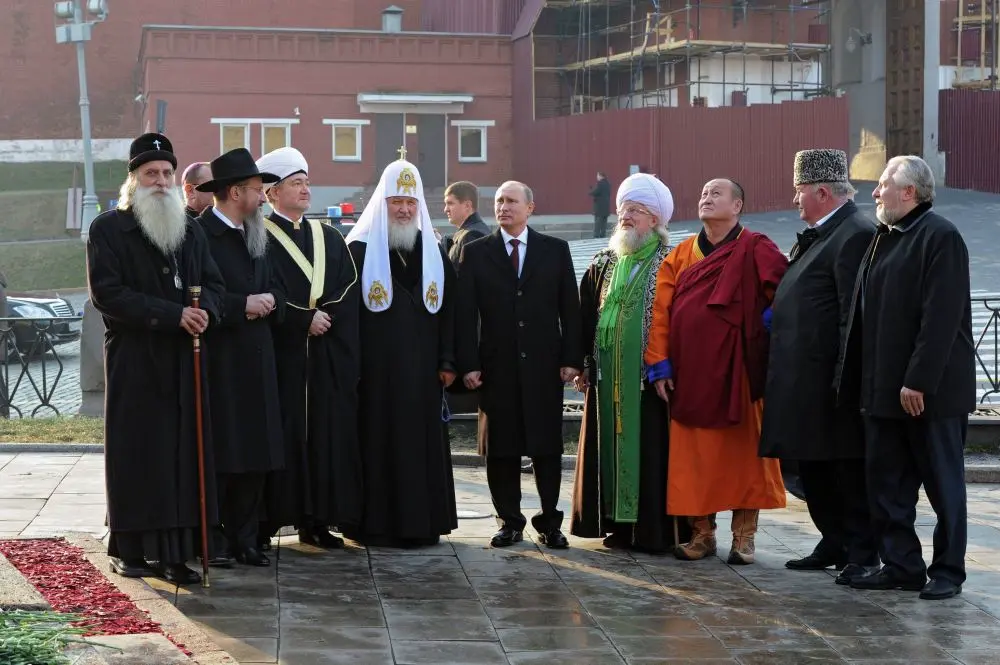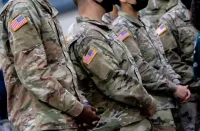The signal being sent by praising Judaism, condemning anti-Semitism, and offering sincere condolences to the Israeli victims of Hamas’ terrorist attack is that the Jewish State can trust him. That’s a prerequisite for Russia breaking the US’ monopoly on the peace process, which Moscow blames for bringing everything to this point, and thus enabling him to mediate between the warring parties in the best-case scenario sometime in the future.
President Putin gave a very important speech on Wednesday during his meeting with representatives of religious associations, which included those from its four officially recognized traditional faiths – Orthodox Christianity, Islam, Judaism, and Buddhism – and others like the Armenian Apostolic Church. The present piece will analyze the insight that he shared with them prior to placing it into the larger context of the latest Israeli-Hamas war.
———-
* Putin considers Christianity, Islam, and also Judaism to be “the world’s major religions”
– “All of us are watching with concern and pain in our hearts the tragic developments in the Holy Land, which holds sacred significance for Christians, Muslims and Jews, for the followers of the world’s major religions.”
* He strongly implied that Hamas’ sneak attack was an act of terrorism that provoked the latest war
– “A new phase in the Palestinian-Israeli conflict has claimed thousands of lives, thousands. Russia knows first-hand what international terrorism is all about. We know what it is like. We will always feel the pain of irreplaceable losses sustained by our country during the years of the war on international terrorism. I would like to offer my sincere condolences to the families of Israelis and citizens of other countries whose loved ones died or were wounded during the October 7 attack.”
* Nevertheless, that doesn’t give Israel the right to collectively punish the Palestinian people
– “But it is likewise clear to us that innocent people should not be held accountable for crimes committed by others. The fight against terrorism cannot be conducted on the notorious principle of collective responsibility resulting in the deaths of elderly people, women, children, entire families. Hundreds of thousands of people are left without shelter, food, water, electricity and medical assistance. This is a genuine humanitarian disaster.”
* Russia still believes in a two-state solution consistent with relevant UNSC resolutions
– “Russia’s position on the Palestinian-Israeli conflict is well known and has been explicitly stated on multiple occasions. It is not influenced by the current circumstances but is based on the UN Security Council resolutions which envisage the creation of two independent sovereign states, Israel and Palestine. This is the key to a lasting and fundamental settlement and peace in the Middle East. This has been the traditional position of the Soviet Union and then Russia since 1948.”
* Stopping the bloodshed and averting a larger war are Russia’s immediate priorities
– “Our primary goal is to stop bloodshed and violence. Further escalation of the crisis poses a risk of severe and highly dangerous and destructive consequences not just for the Middle Eastern region. It can spill far beyond the borders of the Middle East. I have emphasised this repeatedly in my remarks, during numerous telephone conversations, and in personal meetings with the leaders of Middle Eastern and other countries.”
* The West is exacerbating identity differences for divide-and-rule purposes
– “We see attempts made by certain forces to incite further escalation through dragging other countries and nations into the conflict and using them for their own selfish interests, to launch a wave of chaos and mutual hatred not only in the Middle East but far beyond. To this end, they are trying to exploit the ethnic and religious sentiments of millions of people, which has been their policy – if you can call it that – for a long time, long before the current crisis.”

* The religious aspect of the aforesaid plot aims to pit every faith and sect against each other
– “Muslims are pitted against Jews and called on to wage a ‘war against unbelievers.’ Shiites are pitted against Sunnis, and Orthodox Christians against Catholics. In Europe, they turn a blind eye to blasphemy and vandalism against Muslim holy sites. In some countries, they openly, officially glorify Nazi criminals and anti-Semites whose hands are stained with the blood of Holocaust victims. In Ukraine, they are working to outlaw the canonical Orthodox Church and to deepen the schism.”
* Dividing-and-ruling civilizations through these means maintains the West’s neo-colonial hegemony
– “In my view, these actions are clearly designed to sow instability around the world, to divide cultures, peoples and world religions, and to provoke a clash of civilisations. All is based on the well-known principle of divide and conquer. Meanwhile, they keep talking about an obscure ‘new world order,’ which, in reality, is essentially the same: hypocrisy, double standards, claims of exceptionalism and global dominance and preservation of what is essentially a neo-colonial system.”
* This is that bloc’s latest Hybrid War thrust against the entirety of Eurasia
– “The West can see that the emergence of a multipolar world order is gaining speed, and it is deploying all the same means, such as Islamophobia, anti-Semitism and Russophobia, to hinder the progress of independent sovereign countries and divide the global majority.
Of course, the forces that are pursuing such policies or are trying to implement them, benefit from having the epidemic of violence and hatred engulf not only the Middle East but other regions as well, so that old and new hotbeds of tension flare up in Eurasia.”
* The West orchestrated this war, wants to export instability to Russia, and embroil it in that conflict
– “By largely orchestrating the Middle Eastern conflict, fuelling and provoking nationalism and religious intolerance worldwide, these very forces are, without a doubt, pursuing their hostile designs on our country as well.
These goals have been stated openly by the ruling circles in some countries, that is, to inflict, as they say, a ‘strategic defeat’ on us. There is nothing new in this either.
They want the Middle East conflict, as well as any other religious or ethnic conflict in the world to be directly or indirectly tied up with Russia in one way or another or, to be more exact, to deliver a blow to Russia and Russian society.
That is why they will resort to lies and provocations, and use outside and internal pretexts to weaken and split our society, and provoke ethnic and religious strife in our home.”
* Ethno-religious nationalism is a threat to Russia’s multi-ethnic and religiously diverse civilization
– “I want to emphasise that today enormous responsibility for the future of Russia lies with public opinion leaders, the leaders of political parties and civic organisations, the heads of the regions of our vast country, spiritual leaders of traditional religions and with all civil society institutions.
Each of us, whatever we say or do, should be guided by the most important thing – and what is it? – which is the vital interests of our multi-ethnic nation and should always remember that interethnic and interfaith accord is the foundation of the Russian state. Any other position is anti-Russian in character.”
———-
To summarize President Putin’s insight: 1) Hamas’ terrorist attack provoked the latest war; 2) but Israel is wrong to collectively punish the Palestinians because of it; 3) The West is ultimately responsible for this conflict though since the US failed to implement international law during its unipolar heyday; 4) and it’s now exacerbating religious divisions to divide-and-rule Eurasia; and finally, 5) these dynamics pose a threat to Russia’s historically cosmopolitan civilization, but they can be thwarted by truly patriotic forces.
Readers might also have noted how highly the Russian leader regards the Jewish faith seeing as how he described it as one “of the world’s major religions” and warned about rising anti-Semitism despite there being only an estimated 15 million believers. This piece here collected dozens of his quotes about Israel from the official Kremlin website between 2000-2018, which included effusive praise of this religion and the aforementioned state that was established in its name, thus proving his passionate philo-Semitism.
President Putin has felt this way his entire life and isn’t shy talking about it, having boasted as recently as this summer’s Saint Petersburg International Economic Forum that “I have had many Jewish friends since childhood.” This analysis here from earlier in October documented the ways in which his philo-Semitism influenced Russia’s balancing act between Israel and Iran in Syria. Accordingly, it should have been expected that he’d praise Judaism and condemn anti-Semitism in his latest speech to religious groups.
The signal being sent by doing so together with the sincere condolences that he offered to the Israeli victims of Hamas’ terrorist attack, which was officially recognized as such by his Ambassador to Israel here, here, and here and killed around 20 dual Russian citizens, is that the Jewish State can trust him. That’s a prerequisite for Russia breaking the US’ monopoly on the peace process, which Moscow blames for bringing everything to this point, and thus enabling him to mediate between the warring parties.
“Both Sides Should Appreciate Russia’s Principled Neutrality Towards The Israeli-Hamas War” for the reasons argued in the preceding hyperlinked analysis, but regrettably they each regard the latest conflict as existential and are therefore pressuring Russia to support them against their enemies. The US has been trying to discredit Russia’s principled neutrality in Israel’s eyes since the latest conflict began by falsely framing it as favoring Hamas, but there’s no factual truth whatsoever to that claim.
“Russia’s Support Of Palestinian Independence Shouldn’t Be Spun As An Anti-Israeli Policy” and “Russia’s Ties With Hamas Are Pragmatic & Shouldn’t Be Spun As Endorsement Of The Group”, yet many continue to do so since the optics of these policies are relatively easy for propagandists to manipulate in those ways. President Putin therefore took the opportunity to champion the Jewish cause across the world by solidly standing against rising anti-Semitism in an attempt to convince Israel that he can truly be trusted.
This approach aligns with the philo-Semitic sentiments that he proudly shared with the Keren Heyesod Foundation, one of the world’s oldest Zionist lobbying organizations, during their annual conference in Moscow in September 2019. His speech can be read in full here at the official Kremlin website, which all readers are urged to do. Likewise, they should also familiarize themselves with what he said in Jerusalem several months later in January 2020 during the “Fighting Antisemitism forum”, which can be read here.
All of this is relevant because it reaffirms President Putin’s credibility as a neutral mediator for politically resolving the Israeli-Palestinian issue in line with international law upon the eventual end of the latest war, which might also include him mediating between Israel and Hamas if the latter survives. Unlike his Western peers, he recognizes Palestine as an independent state, while his passionate philo-Semitism sets him apart from his Global South peers, most of whom are Islamophiles or aren’t interested in Judaism.
These facts prove that President Putin is indisputably the best person to play this role, but it remains a pipe dream so long as the conflict continues and both sides remain convinced that it’s existential. Therein lies the need for a ceasefire and preventing the conflict’s expansion, both of which might ultimately be impossible but that won’t stop him and his country from trying their best in these regards. The war will eventually end, however, after which he envisages mediating a sustainable and equal peace.
Source: the author’s blog














Comments